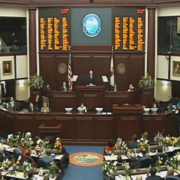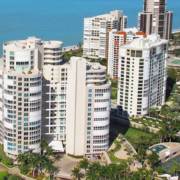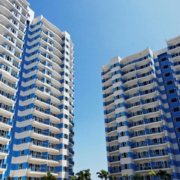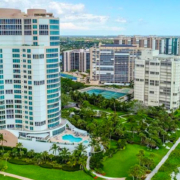HOA House Bill 1203 Becomes Law
House Bill 1203 approved by the Florida Legislature and signed by the Governor of Florida is a mixed bag of 44 pages of new laws affecting Homeowners Associations that will become effective on 7/1/24.
House Bill 1203 is a large and wordy bill covering numerous topics concerning the governance and operation of Homeowners Associations (not Condos- they got House Bill 1021 which was reviewed a few weeks ago). This review is not to go over every change made by the Bill but rather to highlight the changes in no particular order that can be of more importance to most Homeowners Associations. Again, a few overzealous folks in a few isolated HOA’s with some bad actors in their community apparently persuaded their State Legislatures to blindly sponsor and run this bill through the Legislature so that all the well run HOA’s in the State get to suffer from the one off wrongdoings.
OFFICER, DIRECTOR MANAGER CRIMINAL PENAL TIES:
Any Office, Director or Manager who solicits, offers to accept or accepts anything or service of value from any persons providing or proposing to provide goods or services to the Association, or a kickback, without paying consideration for it, commits a third degree felony and shall be deemed to be removed from office (excepted is small gifts associated with a trade show or educational program).
Any Office, Director or Manager who knowingly, wilfully and repeatedly violates any of the statutory requirements to provide access to inspect and obtain copies of Association records to a unit owner or an owner’s authorized representative, with an intent to cause harm to an owner, commits a second-degree misdemeanor and shall be deemed removed from office. Repeatedly is defined as two or more violations within a 12 month period.
Any person who knowingly and intentionally defaces or destroys accounting records that are required by this chapter to be maintained during the period for which such records are required to be maintained, or who knowingly or intentionally defaces or destroys accounting records that are required to be maintained during the period required to be maintained, or who intentionally fails to create or maintain accounting records that are required to be created or maintained, with the intent of causing harm to the association or one or more of its members commits a first-degree misdemeanor.
Any person who will fully and knowingly refuses to release or otherwise produce association records, with the intent to avoid or escape detection, arrest, trial, or punishment for the commission of a crime, or to assist another person with such avoidance or escape commits a felony of the third-degree.
Use of an Association debit card for an expense that has not been properly pre-approved by the Board and reflected in the written minutes or the written budget, even if otherwise a valid Association expense is the commission of theft under Florida Statutes. Depending upon the amount of the theft, it will be punished as a first, second or third degree felony or misdemeanor.
Numerous acts involving Association elections are each a first-degree misdemeanor. Including making a wilfully false affidavit; fraudulently seeking to change a ballot, ballot enveloper, vote or voting certificate; using force or violence or any “tactic of coercion or intimidation: or bribery, menace, threat, or “any other corruption” to try to influence a group of unit owner’s vote; seeking to corruptly influence a vote by giving or promising “anything of value” to someone, other than a wearable campaigning advertisement of nominal value or food at an election rally or aiding an election fraud offender to avoid consequences.
In addition to the present actions providing grounds for an Officer or Director being deemed removed from office (including being charged or indicted for felony theft or embezzlement of Association funds or property), the removal grounds include the above new crimes listed above, as well as forgery of a ballot envelope or voting certificate used in an election and failure to timely provide a unit owner with access to an Association record to inspect or obtain a copy, or the destruction of an Association record which is accessible to unit owners. Repeat violations are not required for not providing the records access.
While a criminal charge is pending, the person is prohibited from serving as a Director or Officer, or having access to official records of any Condominium Association except by a court order.
MANDATORY MANAGEMENT DUTIES:
A Manager or Management Company for an HOA must now attend in person at least one membership or Board Meeting of an Association annually and must provide to the members of the HOA (which the HOA must also post on its website) the name and contact information for each manager or management company representative assigned to the HOA, such persons’ hours of availability and a summary of the duties for which each such person is responsible (this info must be updated within 14 business days of any change).
MANAGER CONTINUING EDUCATION:
Of the 10 hours of continuing education requirement for CAM’s, 5 hours must now pertain specifically to HOA’s and 3 of such hours must be related to record keeping.
ASSOCIATION RECORDS:
HOA’s of 100 or more parcels must post a long list of its records on its website or make them available through a mobile device app. That includes timely notice of membership and Board meetings, with agendas. The posted notices of membership meetings must also include any item to be voted on at the meeting. The notices of Board meetings must include any document required for the meeting (such as proposed contracts to be voted on).
The HOA’s website and any app must include a section accessible to owners and employees only by a user name and password. The law does not state what must be included in the protected portion of the website other than that the protected section must contain the official documents of the association.
The Association cannot post confidential and inaccessible to owners’ access information on the website or app.
The Association must adopt written rules which govern the method or policy for retaining its records, including the retention time periods, which rules must be made available to parcel owners through the website or app.
If the Association receives a subpoena for records from a law enforcement agency, the association must provide a copy of such records or otherwise make the records available for inspection and copying within 5 business days after receipt of the subpoena. The Association must assist a law enforcement agency in its investigation to the extent permissible by law.
ANNUAL FINANCIAL REPORTING:
Unit owners may only vote to reduce the level of annual financial reporting every other year now.
DEBIT CARDS:
An Association and its officers, directors, employees, and agents may not use a debit card issued in the name of the Association, or billed directly to the Association, for the payment of any Association expense. Credit cards are stilled allowed.
OWNERS REQUEST FOR ACCOUNTING OF SUMS DUE:
A parcel owner may make a written request to the board for a detailed accounting of any amounts he or she owes to the association related to the parcel, and the board shall provide such information within 15 business days after receipt of the written request. After a parcel owner makes such written request to the Board he or she may not request another detailed accounting for at least 90 days.
Failure by the Board to respond within 15 business days to such a written request for a parcel accounting constitutes a complete waiver of any outstanding fines of the person who requested such accounting which are more than 30 days past due for which the association has not given prior written notice of imposition of the fines. The waiver of fines applies only to fines and not apply to assessments or other sums due to the Association.
ELECTRONIC VOTING:
It has been clarified that a unit owner may consent to participate in electronic voting “electronically” rather than only “in writing”.
ARCHITECTURAL REVIEW:
A notice of denial by an Association to an owner “for the construction of a structure or other improvement on a parcel must include specification of the rule or covenant relied upon by the Association and the specific aspect of the improvement which does not conform to that covenant or rule.
PROHIBITED RESTRICTIONS:
The Association can only restrict such things as artificial turf, boats, flags, recreational vehicles, vegetable gardens or clotheslines from being located or installed on a unit parcel if they would be visible from the parcel’s frontage, an adjacent parcel, common area or community golf course.
The Association may not restrict pickup trucks in the owner’s driveway or elsewhere that the owner or tenant, guest or invitee has a right to park under state, county, or city regulation.
The Association may not restrict the parking of a work vehicle of the owner or tenant, guest or invitee, regardless of official insignia or visible designation, in the owner’s driveway. Excepted work vehicles the Association can still restrict are non-governmental vehicles weighing more than 26,001 pounds or has three or more axles. Excepted from the large vehicle exception which the Association must also allow is “race care transports” (obvious constituent or lobbyist special cave out).
In addition to Associations not being able to restrict parking of law enforcement vehicles, now it cannot also restrict vehicles used by firefighters, . EMT’s, and paramedics (first responder vehicles).
Associations cannot restrict an owner from using a contractor or worker solely because the contractor or worker is not on the Association’s preferred vendor list.
Associations can no longer levy a fine or suspension of use of common area use rights for leaving garbage receptacles at the curb or end of the driveway within 24 hours before or after the designated garbage collection day or time.
Associations can no longer levy a fine or suspension of use of common area use rights for leaving holiday decorations or light on a structure or other improvement on a parcel longer than indicated in the governing documents, unless such decorations or lights are left up for longer than 1 week after the association provides written notice of the violation to the parcel owner.
ENFORCEMENT FINES AND SUSPENSIONS:
The 14 day minimum notice to an owner of an intent to impose an enforcement fine or suspension of common area use rights must be in writing and must now include a statement of the right to a hearing, date and location of the hearing and a description of the violation and action required to cure it.
The hearing before a fining or suspension committee must now be held within 90 days of the issuance of that notice.
The fining or suspension committee may hold the hearing by telephone or other electronic means (Zoom) and if so the notice of the hearing must state so.
If the owner cures the violation before the hearing, a fine or suspension shall not be imposed.
After a hearing, the notice of fine or suspension levied must state how the owner may cure the violation, how the suspension may be fulfilled and when the fine must be paid {not sooner than 30 days). This notice must be provided to the owner not later than 7 days after the hearing.
If the violation is cured after the post notice hearing, then the fine or suspension may not be imposed. So the post hearing notice should probably state a deadline to cure the violation (such as 30 days) in order to negate the fine or suspension.
Attorney’s fees and costs incurred after the deadline to cure or pay the fine in the post hearing notice may be awarded to the Association, but not those incurred prior to that date. This would assume court action would be needed to collect the fine or enforce a suspension where the court could award prevailing party attorney’s fees.
MANDATORY DIRECTOR EDUCATION:
Previously, a new Director could choose between attending a Director Education class or sign a certificate that the Director has read the condominium documents. Now both are required for new and existing Directors by June 30, 2025. New Directors will have 90 days from the election or appointment. The education requirement is valid for 4 years from the date of the certificate and must be repeated for any Board service after that. Directors of Associations must complete at least 4 hours of continuing education annually.





